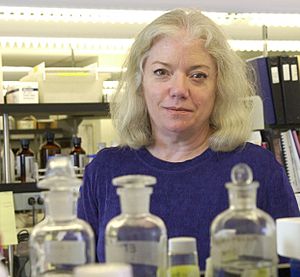C. Sue Carter facts for kids
Quick facts for kids
C. Sue Carter
|
|
|---|---|
 |
|
| Born |
San Francisco, California, United States
|
| Nationality | American |
| Alma mater | University of Arkansas |
| Known for | Characterizing the role of Oxytocin and Vasopressin in the neurobiology of monogamy and love |
| Awards | American Association for the Advancement of Science |
| Scientific career | |
| Fields | Behavioral neuroscience |
| Institutions | The Kinsey Institute |
C. Sue Carter is an American biologist and brain scientist who studies behavior. She is known around the world for her work in behavioral neuroendocrinology. This field looks at how hormones affect our brains and actions. In 2014, she became the Director of The Kinsey Institute and a professor at Indiana University. Dr. Carter was the first person to figure out how our bodies create the feelings and actions linked to social monogamy, which is when animals (or people) form a strong, lasting bond with one partner.
Contents
About Dr. Carter
Dr. Carter studied biology at Drury College in Missouri. She then earned her PhD in Zoology from the University of Arkansas.
She is a respected member of the American Association for the Advancement of Science. This is a group that supports science and helps scientists share their discoveries.
Dr. Carter is married to Stephen Porges. They have two children. Their son, Eric Carter Porges, is studying neuroscience at the University of Chicago. Their other son, Seth Porges, works as an editor for Maxim magazine in New York City.
Dr. Carter's Scientific Discoveries
Dr. Carter's research focuses on how animals and humans form social bonds. She also studies how parents behave and how stress and reproduction are controlled by social interactions. She often uses small animals called prairie voles in her studies. These voles are a good example because they form strong, lasting pairs.
Hormones and Behavior
Dr. Carter's work looks at special chemicals in the body called neuropeptides and steroid hormones. These include oxytocin, vasopressin, and estrogen. She has found that oxytocin and vasopressin have important roles in how brains develop. They also affect how early social experiences can have long-lasting effects on us.
She is also interested in how medical treatments can affect human development. For example, she studies the use of "pitocin," which is a man-made version of oxytocin. This is sometimes used to start labor during childbirth. She also researches how breastfeeding affects both mothers and babies.
Brain Health and Social Bonds
More recently, Dr. Carter has been studying how oxytocin and vasopressin might be linked to mental health conditions. These include autism, schizophrenia, anxiety, and depression.
She is also famous for her research on the biological reasons behind social behavior. Her studies showed that oxytocin, vasopressin, and stress hormones are important for forming strong bonds. This includes the special bonds seen in monogamy.
Pioneering Prairie Vole Research
Dr. Carter was one of the first scientists to study socially monogamous mammals. She worked with zoologist Lowell Getz to show how prairie voles form lasting pairs. Her research on these small rodents helped scientists understand how oxytocin and vasopressin affect human behavior and development. She also worked with psychiatrist Margaret Altemus. Together, they showed how important breastfeeding is for a mother's body.
Awards and Recognition
Dr. Carter is a respected member and former president of the International Behavioral Neuroscience Society. She also received the Matthew J. Wayner-NNOXe Pharmaceuticals Award. This award recognizes her important contributions to the study of how the brain affects behavior.
Selected Publications
- Carter C.S., Getz L.L. (1993) Monogamy and the prairie vole, Scientific American 268: 100–106
- Carter C.S. & Keverne EB. (2002) The neurobiology of social affiliation and pair bonding, In Hormones, Brain and Behavior, edited by D. Pfaff, pp. 299–337, Academic Press, San Diego CA
- Carter C.S. (2003) Developmental consequences of oxytocin. Physiology and Behavior 79: 383–397
- Carter C.S. (2007) Sex differences in oxytocin and vasopressin: Implications for autism spectrum disorders?, Behavioural Brain Research. 176: 170–186
- Goldman M., Marlow-O'Connor M., Torres I., Carter C.S. (2008) Diminished plasma oxytocin in schizophrenic patients with neuroendocrine dysfunction and emotional deficits, Schizophrenia Research 98: 247–55
- Carter C.S., Grippo A.J., Pournajafi-Nazarloo H., Ruscio M.G., Porges S.W. (2008) Oxytocin, vasopressin and social behavior, Progress in Brain Research 170: 331–336
Books Dr. Carter Has Contributed To
- Carter C.S., Lederhendler I.I. & Kirkpatrick B. (1997) The Integrative Neurobiology of Affiliation, Annals of the New York Academy of Sciences 807 (Re-released by MIT Press, Cambridge, MA, 1999)
- Uvnas-Moberg, K. & Carter, C.S. (1998) Special issue of Psychoneuroendocrinology: Proceedings of a Conference Sponsored by the Wenner-Gren Foundation: Stockholm, Sweden entitled Is There a Neurobiology of Love?
- Cacciopo J., Berntson G.G., Adolphs R., Carter C.S., Davidson, J., McClintock, M.K., McEwen, B.S. Meaney, M.J., Schacter, D.L., Sternberg, E.M., Suomi, S.S. & Taylor, S.E. (2002) Foundations in Social Neuroscience, A Bradford Book, MIT Press, Cambridge MA
- Carter C.S., Ahnert L., Grossmann K., Hardy S.B., Lamb M., Porges S.W., & Sachser N. (eds.) (2005) Attachment and Bonding: A New Synthesis, MIT Press, Cambridge MA
See Also
- Biological psychology
- Psychiatry
- Neuroendocrinology
- Neuropeptides
- Neuroscience
- Love
- Evolution
- Social cognition
- Social Neuroscience

